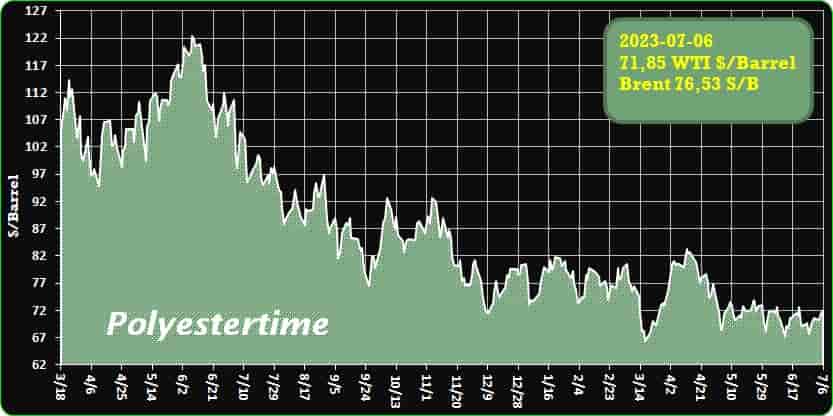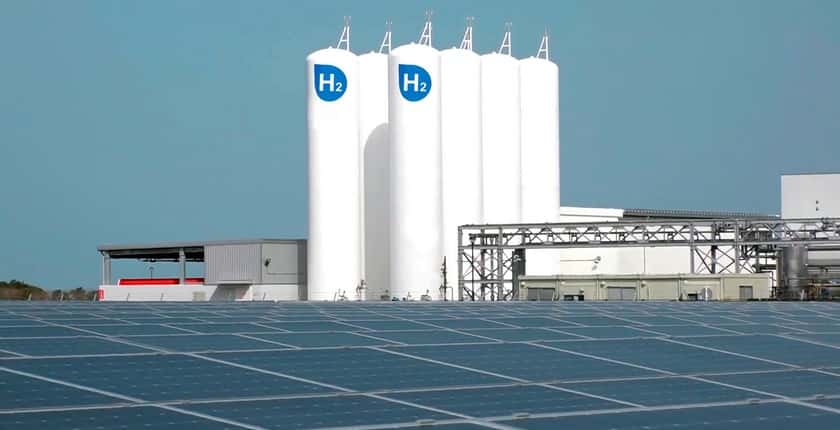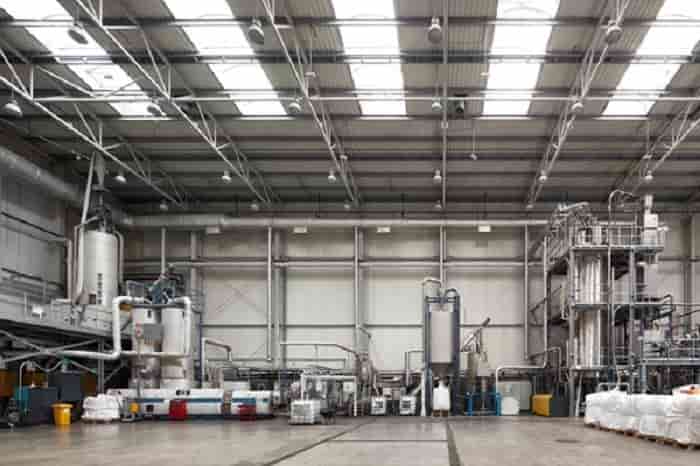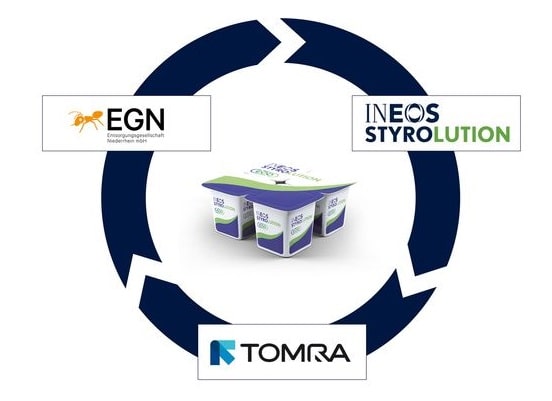Carbon fiber – Amazing innovative polystyrene recycling – What future for Green Hydrogen? 06-07-2023 - Arhive
Carbon fiber
Crude Oil Prices Trend

Crude Oil Prices Trend by Polyestertime
-Huntsman and V-Carbon Technologies have formed a partnership aimed at revolutionizing the recycling of carbon fiber
Carbon fiber composites, known for their strength, lightness, and durability, have become widely used in various industries, including automotive and aerospace. However, their end-of-life disposal has posed significant challenges thus far.
Traditionally, carbon fiber materials have been disposed of in landfills or incinerated due to the limited availability of recycling options. While some companies are exploring recycling methods for carbon fiber, few have focused on recycling the entire composite, including the fiber and resin components. Carbon fiber
To address this sustainability issue, experts from Huntsman’s Advanced Materials division approached several recycling companies to propose collaboration in recovering and recycling both the fiber and chemical components. They found a suitable partner in V-Carbon Technologies, an advanced materials technology company based in the UK.
V-Carbon Technologies has developed a fully integrated carbon fiber circular economy for industries such as aerospace, automotive, wind energy, and manufacturing. Their innovative process chain enables the production of advanced material systems using second-life carbon fibers, which retain their mechanical performance and can be seamlessly integrated into existing manufacturing processes for high-performance applications. Carbon fiber
Key to V-Carbon’s technology is a patented chemolysis process that allows the repurposing of carbon fiber and chemical resins obtained during the recycling process. Huntsman, with its expertise in developing and manufacturing chemical products, will analyze the resin recyclate resulting from the chemolysis process. By studying this output, Huntsman aims to identify new uses for the material, addressing the current end-of-life challenges associated with high-performance composite materials. Carbon fiber
The partnership between Huntsman and V-Carbon aims to develop and optimize the recovery of chemicals present in the chemolysis recyclate, which was previously not feasible. This collaboration opens up additional opportunities for circular manufacturing by identifying sustainable solutions for the entire carbon fiber composite material.
Damian J. Cessario, founder and CEO of V-Carbon Technologies, expressed enthusiasm about the partnership, stating that working with Huntsman will provide added value to customers and society as a whole. The collaboration enables V-Carbon Technologies to expand its carbon fiber yarn production and offers sustainable circularity solutions for the entire carbon fiber composite material. Carbon fiber

-Sinopec Xinjiang Kuqa Green Hydrogen Pilot Project Commences Operations, Leading the Way in China’s Green Hydrogen Advancement
China Petroleum & Chemical Corporation has announced the successful initiation of operations for the Green Hydrogen Pilot Project in Kuqa City, Aksu Prefecture, Xinjiang Uygur Autonomous Region, as reported by Polymerupdate. This significant milestone signifies Sinopec’s commitment to developing clean hydrogen technologies and facilitating China’s transition towards a greener and more sustainable energy system.
Led by Sinopec’s New Star Company, this ambitious project stands as the world’s largest solar-to-hydrogen initiative and the first of its kind in China. Carbon fiber
It incorporates a photovoltaic power generation complex, power transmission and transformation lines, as well as facilities for water electrolysis hydrogen production, hydrogen storage and transportation, and auxiliary production support.
Green hydrogen, produced using renewable power sources like solar and wind energy, reduces the carbon footprint throughout the entire production process. Leveraging the abundant photovoltaic resources in Kuqa, the project harnesses solar power to electrolyze water, resulting in an annual production capacity of 20,000 tons of green hydrogen. It also includes facilities to store 210,000 cubic meters of hydrogen and transport 28,000 cubic meters per hour. Carbon fiber
Serving as a demonstration project, it paves the way for green hydrogen refinement and sets a precedent for green hydrogen production in China. The project supplies hydrogen to Sinopec’s Tahe Refining & Chemical plant, replacing fossil fuel-based electricity for hydrogen production. This switch is expected to reduce carbon dioxide emissions by 485,000 tons annually.
With a strong focus on hydrogen-powered transportation and green hydrogen refinement, Sinopec aims to become a leading force in hydrogen production innovation in China. Their self-developed megawatt-scale PEM electrolysis hydrogen production station, with an annual capacity exceeding 4.5 million tons, is now operational. Carbon fiber
Additionally, Sinopec has launched its first hydrogen demonstration project in the Inner Mongolia Autonomous Region, set to produce 30,000 metric tons of hydrogen annually starting in 2023.
It’s worth mentioning that Sinopec has recently completed trial runs at a one million tonnes-per-year ethylene plant in Hainan province, which will boost exports. This facility is part of a 28.6 billion-yuan (USD 4.15 billion) complex and represents the second major petrochemical plant to commence operations this year, following a similar-sized facility announced by PetroChina in Guangdong province. Carbon fiber

-Syclus choses Axens to provide Atol® technology for Europe’s first ethanol-based renewable ethylene production plant
Syclus intends to build and operate a plant for the production of renewable ethylene from sustainable ethanol in Chemelot Industrial Park, Geleen, The Netherlands. With an annual production capacity in the range of 100,000 tonnes, this renewable ethanol-to-ethylene production plant would be a first in Europe, paving the way for a more sustainable way of producing plastics.
The facility will rely on Atol® technology from French company Axens. Among many other benefits, Atol® features very high, cost-effective, ethylene yields thanks to a best-in-class catalyst, and allows for an optimized use of process energy, which minimizes emissions. The technology can produce ethylene widely regarded as having the highest quality on the market, fulfilling the specifications required by Chemelot and also by the ARG, the extensive ethylene pipeline network in Northwest Europe. Sinopec Xinjiang Kuqa Green Hydrogen Pilot Project Commences Operations, Leading the Way in China’s Green Hydrogen Advancement Carbon fiber
Basic engineering is scheduled to start in late 2023, and production in 2026. Ethanol will be regionally produced by CropEnergies, who operates a plant for the production of renewable ethanol nearby and who has aquired a major share in Syclus in 2022. The investment required is estimated to be more than EUR 130 million.
Syclus has selected Axens as licensor for the ethanol to ethylene project. Axens’ Atol technology provides a high efficiency combined with a low energy consumption process next to high product quality and safety performance. Carbon fiber
This supports Syclus’ ambition to set a new benchmark in renewable ethylene. Based on our cooperation Axens has shown to share Syclus’ ambition and we are convinced to have selected the right partner to make the design, construction and operation of our plant a success. Sinopec Xinjiang Kuqa Green Hydrogen Pilot Project Commences Operations, Leading the Way in China’s Green Hydrogen Advancement

-54,000 tonnes of rPET per year: ALPLA expands recycling plant in Poland
ALPLA is continuing the global expansion of its circular economy with the expansion of its recycling plant in Radomsko (Poland). The internationally active packaging and recycling specialist is investing around eight million euros in the third extrusion line at the site. The annual production capacity will increase from 30,000 to 54,000 tonnes of food-grade PET recycling material (rPET). This makes the PET Recycling Team (PRT) Radomsko one of the largest recycling plants of its kind in Europe. Carbon fiber
Packaging specialist ALPLA is securing the long-term supply of food-grade PET recycling material (rPET) by expanding the recycling plant in Radomsko. The internationally active company is investing around eight million euros in a state-of-the-art extrusion line. Ten years after its opening, the PET Recycling Team (PRT) Radomsko is one of the largest recycling plants for this material in Europe with a production capacity of 54,000 tonnes of food-grade rPET pellets per year. Carbon fiber
“ALPLA stands for sustainable packaging solutions made of plastic. As a system provider, we develop products optimised for recycling, process high proportions of recyclate in production and take care of efficient recycling. With our global focus on recycling and our commitment in Central and Eastern Europe, we make a significant contribution to the regional bottle-to-bottle cycle,” explains Dietmar Marin, ALPLA Managing Director Recycling Division.
Promoting the recycling loop Carbon fiber
By 2025, all PET beverage bottles in the EU should contain at least 25 per cent post-consumer recycled (PCR) material. With the expansion of the site in Poland, ALPLA is creating the basis for meeting the EU requirements in the regional markets. “We actively work with customers to create closed loops for PET packaging and accompany them on their sustainability path. To this end, we are taking care of meeting tomorrow’s needs today and already have some excellent examples in reality,” emphasises Mariusz Musiał, ALPLA Country Manager Poland. Carbon fiber
“With this investment we are targeting the Polish market in particular and ensuring that sufficient rPET is available to our customers”, adds Beata Szynkiewicz-Razik, Commercial Director of PRT Radomsko.

-Yontex, a joint venture formed by the merger of Drinktec and BrauBeviale, the leading trade fairs for the beverage and liquid food industry, aims to strengthen their positions in the global market
The company, based in Nuremberg, officially commenced operations on July 1, 2023, with Rolf M. Keller, a seasoned professional in the field of beverage industry trade fairs, appointed as the CEO. Carbon fiber
Despite joining forces, Drinktec and BrauBeviale will continue to operate as independent brands, maintaining their respective names and hosting events at their usual locations in Munich and Nuremberg. The collaboration under the Yontex umbrella aims to position Bavaria as the preferred meeting place for the global beverage industry, fostering synergies and providing added value for trade fair customers.
This merger marks the largest combination of two flagship trade fairs in Germany to date. Both Drinktec and BrauBeviale will be able to pursue individual growth, expand their national and international reach in terms of customer contacts, and pool resources for the benefit of exhibitors and visitors. The CEOs of Messe München and NürnbergMesse, the organizing companies, recognize the unique opportunity presented by this joint venture, stating their intention to compete as separate trade fair venues while collaborating on a global scale. Carbon fiber
Yontex’s debut will take place at the BrauBeviale event in Nuremberg from November 28 to 30, 2023. The trade fairs will maintain their existing venues, brand names, and key contacts. Both events will continue to follow their regular cycles, with Drinktec occurring every four years at the Munich Exhibition Centre, next in 2025, and BrauBeviale maintaining its annual schedule at the Nuremberg Exhibition Centre, except during Drinktec years. Drinktec also holds additional events in India (drink technology India) and China (China Brew China Beverage). Carbon fiber
Yontex will be led by a 19-person team comprising experienced trade fair professionals from both Drinktec and BrauBeviale, as well as new additions. The team includes CEO Rolf M. Keller, Executive Vice President Petra Westphal, Executive Director BrauBeviale Andrea Kalrait, Executive Director Drinktec Cluster Markus Kosak, and Executive Director Operations Moritz Müller. Carbon fiber
Industry professionals and enthusiasts are encouraged to visit Yontex to experience the collective strength and value offered by this joint venture, facilitating the advancement and success of Drinktec and BrauBeviale in their highly competitive global environment.

-Tomra, Ineos Styrolution, and EGN have joined forces to launch an innovative polystyrene recycling project
This groundbreaking partnership involves a collection and sorting specialist (Tomra), a leading styrenics producer (Ineos Styrolution), and a recycler (EGN Entsorgungsgesellschaft Niederrhein). Together, they aim to convert post-consumer polystyrene waste into food-grade polystyrene through a state-of-the-art recycling facility.
EGN will construct an advanced mechanical recycling plant in Krefeld, Germany, specifically designed to process 40kt of post-consumer polystyrene waste annually. This facility is set to be the first large-scale plant of its kind. Carbon fiber
Tomra Feedstock will be responsible for collecting post-consumer polystyrene food packaging waste and delivering it to the facility, while EGN will handle the sorting and washing processes.
Ineos will oversee the implementation of its proprietary super-cleaning purification process, which utilizes advanced decontamination technology in the melt phase. This process involves high temperatures and a vacuum pump to remove moisture and oxygen, ensuring that the recycled polystyrene (rPS) meets the European Food Safety Authority (EFSA) requirements for food contact applications. Carbon fiber
Ineos developed this technology to enable future upscaling capabilities for processing large volumes.
Polystyrene is known for its excellent sortability in the waste stream and is one of the few polymers that can achieve food-grade quality through mechanical recycling. The collaboration between the three companies aims to create a true circular economy for polystyrene, offering infinite recyclability and maintaining the material’s virgin-quality properties even after multiple recycling cycles. Carbon fiber
Pierre Vincent, Managing Director at EGN, believes that the dairy industry, in particular, will benefit from this project, as it will enable the mechanical recycling of polystyrene yogurt pots, fostering a circular approach for this material.
Jürgen Priesters, Senior Vice President of Tomra Feedstock, emphasized that polystyrene is well-suited for mechanical recycling in food applications, aligning with the mission of Tomra Feedstock to promote circularity for polystyrene. Carbon fiber
By combining their expertise, the three companies aim to provide customers with high-performing circular polystyrene, significantly reducing the carbon footprint associated with its production. The project has already garnered substantial interest from customers and brand owners, who are eager to secure long-term contracts.
The new plant in Krefeld is scheduled to commence operations in mid-2025, enabling Ineos Styrolution’s customers to access commercial quantities of recycled polystyrene (rPS). Carbon fiber

-German Sales Plummet and Economy Slows Down as Major Companies Invest Overseas
Opening a shop in Hamburg or on the banks of the Rhine might be a wise move as the latest market data reveals a significant decline in commercial real estate sales in Germany. During the first half of 2023, sales plummeted by 50%, causing devastating effects on real estate companies. Vonovia, the largest company in the sector, experienced a 14% loss in the same period, positioning it as the worst-performing stock in the Eurostoxx 50 index. Unfortunately, short-term prospects do not appear favorable, as projected sales are expected to be one-third less than the average of the past five years.
Even in Germany, known for the strictness of its Bundesbank, the surge in mortgages has driven potential buyers away. Carbon fiber
Despite decreasing prices, the accumulated debts from prosperous years prevent sales from falling below certain thresholds. The housing market is also suffering, with a 69% decline in transactions compared to 2022, according to a study by Bnp Real Estate.
The overall malaise in the German economy is evident, as indicated by the slowdown in the PMI services index, which dropped to 50.4 in June from 53.9 in May. This decline aligns with the diminishing manufacturing prospects. While the German Stock Exchange remains close to its peak, the growing internationalization efforts of major companies are causing concern among politicians and the general public. Carbon fiber
A study by the German Economic Institute (IW), based on OECD data, reveals that in 2022, Germany invested 125 billion euros in foreign countries, while receiving only 10.5 billion euros in foreign direct investments. This ongoing trend shows no signs of stopping, with BASF planning to establish a significant plant in China to protect its market position. Meanwhile, automotive giants are exploring incentives offered by the Biden plan to boost production on American soil. Notably, Volkswagen recently announced substantial investments in Brazil.
Is the flight of industries a cause for alarm? In reality, it represents a complex transition for a country that suddenly finds itself grappling with the challenges of an aging economy. The German automotive sector, once the leader, is now facing challenges due to the transition to electric vehicles. Carbon fiber
The traditional mechanical excellence associated with “Made in Germany” holds less sway in the realm of electric cars, prompting major companies to acquire knowledge and expertise from prominent US electronics firms. Furthermore, Germany has promised ten billion euros to Intel for the development of a chip plant in Saxony, which is becoming a hub for investments in the electric vehicle industry. Additionally, Catl, the Chinese battery leader, is set to establish a factory there, further cementing the region’s significance.
These developments call for caution when considering the prospects of the European economy in the coming months. The dependence of many industries in Italy and other European countries on Germany suggests that growth may be challenging without a strong recovery in the German market. Carbon fiber
This sentiment is reflected in the final composite PMI index of Hcob, published by S&P Global, which serves as an indicator of the region’s economic health. In June, the index fell to 49.9 points from 52.8 in May, dipping below the threshold of 50 that separates expansion from contraction for the first time since December. Current estimates hover around 50.30 points.
In summary, it appears that Europe’s locomotive, Germany, is undergoing a delicate and urgent overhaul of its economic engine. This operation is complicated by high energy costs, challenges in international trade, and the overall impact of the global economic crisis. Carbon fiber

